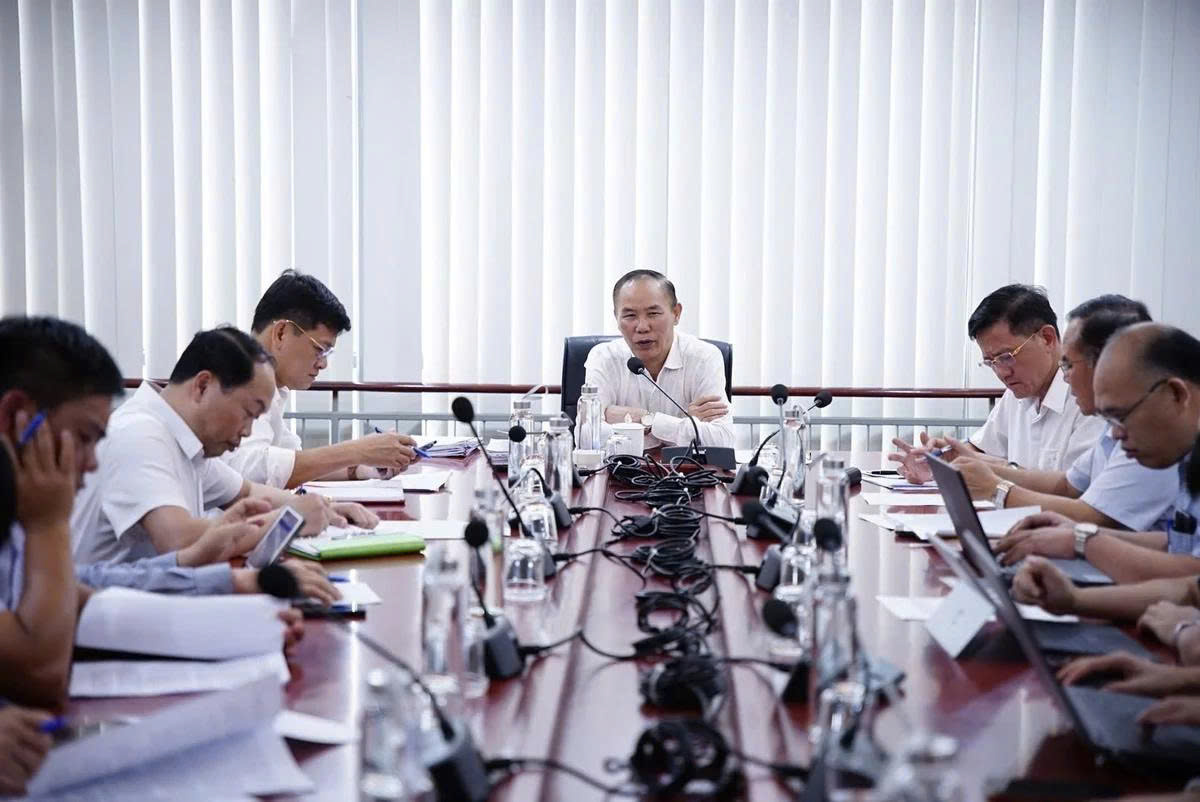On the afternoon of June 19, Deputy Minister of Agriculture and Rural Development Phung Duc Tien chaired a meeting to address and rectify efforts in combating the smuggling of animals and animal products.
Anti-smuggling inspections must not become merely a formality
At the meeting, Deputy Minister Phung Duc Tien emphasized that the livestock industry currently contributes about 26% to the total value of agricultural production, with a growth rate of 5.4% last year and a target of 5.7–5.9% for this year. “If we fail to maintain this growth rate, it will be a complete collapse,” he stressed, warning that the recent surge in poultry smuggling—especially in the northern border provinces—is severely impacting domestic production.

Photo: Linh Linh.
“For poultry alone, over the past three years, many farmers have had to sell their land-use rights and cars just to maintain their flocks. Poultry meat currently accounts for about 28% of the total 7.7 million tons of meat produced annually—roughly 2.2 million tons. If smuggling continues unchecked, the entire industry will suffer severely,” warned Deputy Minister Tien.
He expressed particular concern over the blatant illegal trade and transportation of poultry taking place openly on roads, while local veterinary officers failed to act. “It’s unacceptable for poultry trucks to be operating so visibly while veterinary and quarantine officials claim no responsibility. If they are not complicit, then they are neglecting their duties—this must be dealt with seriously,” he stressed.
In addition, Deputy Minister Phung Duc Tien emphasized that inspection and monitoring efforts should not only be limited to peak periods but must be carried out regularly and continuously. Based on that, professional agencies need to provide tailored advice appropriate to each locality’s specific conditions, avoiding vague and impractical directives.
Reporting at the meeting, Mr. Duong Tat Thang, Director General of the Department of Livestock Production and Animal Health, stated that in the first five months of 2025, the department organized six task forces. Among them, three teams inspected the smuggling of breeding animals in Hanoi, Hai Duong, and Quang Ninh—key hotspot areas. There were also unannounced inspections of veterinary drugs, animal feed, and environmental treatment operations in Bac Giang, Thai Nguyen, and Dong Nai.
The department also recorded strong cooperation between border animal quarantine units in Lao Cai, Lang Son, and Quang Ninh and border forces. As a result, 47 violations were handled, over 4,130 smuggled breeding birds (chicks, ducklings, ornamental birds) were destroyed, along with 15.4 tons of smuggled animal products (meat, organs, processed products like sausages and cured meat), and 24,000 poultry eggs.
“The department considers anti-smuggling efforts not as occasional campaigns, but as an ongoing, consistent mission,” Mr. Thang emphasized. “Close coordination with police and border forces is crucial to ensuring effectiveness.”
Deputy Minister Phung Duc Tien praised the role of the police force, highlighting their importance in addressing key incidents, ranging from African swine fever and avian influenza to IUU-related violations.
According to a report from the Criminal Police Department (C05) under the Ministry of Public Security, law enforcement units have proactively investigated and tackled key cases, such as the seizure of smuggled breeding poultry in Tay Ninh, as well as illegal seafood operations involving green and ornate spiny lobsters in Khanh Hoa. Other cases involved the laundering of smuggled pork through slaughterhouses in Long An.
Between 2024 and 2025, 11 criminal cases were prosecuted, including major ones involving smuggled animal products, breeding stock, and counterfeit dietary supplements.
“More than 6 million livestock-raising households are direct beneficiaries of the livestock sector’s success. Therefore, anti-smuggling efforts must be further strengthened,” Deputy Minister Tien affirmed.
Addressing weaknesses in state management and the role of associations
Alongside initial achievements, Deputy Minister Tien candidly pointed out several shortcomings:
“State management remains weak, and in many areas, the role of local veterinary sub-departments is unclear and lacks determination. If frontline control were tightened, smuggled goods would certainly not be able to enter.”

Photo: Cuong Vu.
Regarding the role of associations, Deputy Minister Tien emphasized the need for stronger engagement. “They cannot stand on the sidelines—they must proactively report issues, coordinate efforts, and even enhance whistleblowing activities. Associations must not be passive in their responsibility to businesses, cooperatives, and the entire industry,” he stated.
Also during the meeting, Deputy Minister Phung Duc Tien directed the Department of Livestock Production and Animal Health to work closely with border forces, reviewing existing directives and regulations on anti-smuggling, and to establish a well-structured coordination mechanism.
“There must be six-month reviews and annual summaries to assess the effectiveness of coordination efforts, and to revise any outdated or ineffective regulations,” he instructed.
In addition, the Deputy Minister proposed the development of a rapid verification mechanism, ensuring that professional units can respond immediately to requests from the police to guarantee timely and effective handling of cases.
A matter of particular concern to Deputy Minister Tien was the lax management of imported vaccines, veterinary drugs, and biological products.
“Why haven’t we detected them yet? Why are these products being sold widely on the market without proper testing or evaluation? If fake drugs are rampant, where is the role of state management?” he asked, calling for a clear review of responsibilities.
This, he noted, is a lesson learned from past instances where warehouses containing unsafe food, counterfeit drugs, and substandard products were discovered but inadequately dealt with.
Concluding the meeting, Deputy Minister Phung Duc Tien stressed:
“To protect more than 6 million livestock-raising households, we must take real, decisive action. There must be criminal cases to serve as deterrents.”
He affirmed that if the entire system works together—with strong coordination among the Department of Livestock and Animal Health, the police, border guards, local authorities, and industry associations—nothing is impossible.
Linh Linh – Agriculture & Environment Newspaper
